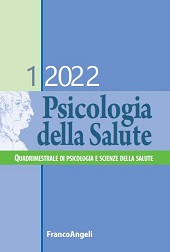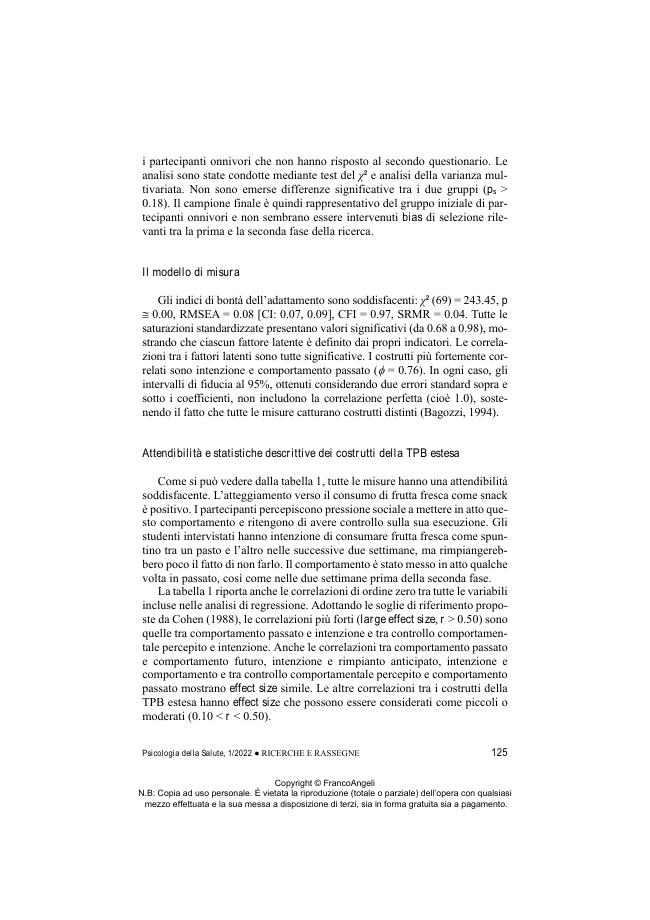Il ruolo del rimpianto anticipato nella previsione del consumo di frutta come snack tra i giovani
P. 114-136
Lo studio esplora il ruolo del rimpianto anticipato nella teoria del comportamento pianificato (Theory of Planned Behaviour, TPB; Ajzen, 1991) applicata al consumo di frutta come snack. Il modello ipotizzato estende la TPB con l'inclusione del comportamento passato e del rimpianto anticipato. Gli obiettivi principali sono: a) testare se il rimpianto anticipato migliori il potere predittivo della TPB, anche dopo aver considerato il comportamento passato; b) analizzare se il rimpianto moderi la relazione tra intenzione e comportamento.
Lo studio è stato con-dotto in due fasi, a distanza di due settimane. Nella prima fase, il questionario strutturato online includeva le misure dell'intenzione e dei suoi antecedenti e item per rilevare il comportamento passato e il rimpianto anticipato. Nella seconda è stato rilevato il comportamento di consumo di frutta fresca come snack nelle due settimane precedenti. Ha partecipato allo studio un campione di convenienza di 361 studenti universitari italiani.
I risultati ottenuti mediante le analisi di regressione mostrano che comportamento passato e rimpianto anticipato migliorano la capacità della TPB di prevedere sia l'intenzione sia il comportamento futuro. Inoltre, il rimpianto modera l'effetto dell'intenzione sul comportamento, che è significativo solo quando il rimpianto è elevato. In conclusione, i risultati supportano l'importanza di considerare il rimpianto anticipato nella previsione delle intenzioni di mettere in atto questo comportamento alimentare salutare e l'utilità di far leva su questa reazione affettiva per rinforzare il legame intenzione-comportamento. [Testo dell'editore]
The study explores the role of anticipated regret in the Theory of Planned Behavior (TPB; Ajzen, 1991) applied to the consumption of fruit as snack. The hypothesized model extends the TPB with the inclusion of past behavior and anticipated regret. The main objectives are: a) to test whether anticipated regret improves the predictive power of TPB, even after considering past behavior; b) to analyze whether regret moderates the relationship between intention and behavior.
The study was conducted in two phases, with a time leg of two weeks. In the first phase, the online structured questionnaire included measures of intention and its antecedents and items to detect past behavior and anticipated regret. In the second, the behavior of eating fresh fruit as snack in the previous two weeks was surveyed. A convenience sample of 361 Italian university students participated in the study.
Results of the regression analyses proved that past behavior and anticipated regret improve the ability of the TPB to predict both inten-tion and future behavior. Furthermore, regret moderates the effect of intention on behavior, which is significant only when regret is high. In conclusion, the results support the importance of considering anticipated regret in predicting the intentions of implementing this healthy eat-ing behavior, and the usefulness of leveraging on this anticipated affect to reinforce the intention-behavior link. [Publisher's text]
Fait partie de
Psicologia della salute : quadrimestrale di psicologia e scienze della salute : 1, 2022-
Articles du même numéro (disponibles individuellement)
-
Informations
Code DOI : 10.3280/PDS2022-001007
ISSN: 1972-5167
VEDETTES-MATIÈRE
- Teoria del comportamento pianificato, Rimpianto anticipato, Comportamento passato, Consumare frutta come snack
- Theory of planned behavior, Anticipated regret, Past behavior, Eating fruit as snack



